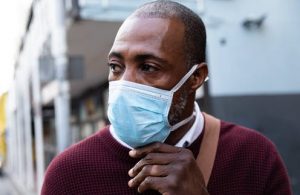More Minority Participants Needed for COVID-19 Trials
 The recent announcement by Pfizer of a potentially effective COVID-19 vaccine has led to great excitement, even though some nurses express misgivings about the speed of COVID-19 vaccine development. This vaccine development would not be possible, of course, without the participation of many thousands of volunteers in clinical trials. Unfortunately, minority participation in these COVID-19 trials has lagged.
The recent announcement by Pfizer of a potentially effective COVID-19 vaccine has led to great excitement, even though some nurses express misgivings about the speed of COVID-19 vaccine development. This vaccine development would not be possible, of course, without the participation of many thousands of volunteers in clinical trials. Unfortunately, minority participation in these COVID-19 trials has lagged.
“As we strive to overcome the social and structural causes of health care disparities, we must recognize the underrepresentation of minority groups in COVID-19 clinical trials,” notes a column in the August 27, 2020 issue of The New England Journal of Medicine.
A major reason for this underrepresentation involves “distrust of researchers, healthcare in general when it comes to communities of color,” notes Ernest J. Grant, PhD, RN, FAAN, president of the American Nurses Association (ANA). That distrust, he notes, harkens back to such appalling experiences as the “Tuskegee Study of Untreated Syphilis in the Negro Male,” where hundreds of Black men were recruited to study syphilis without treatment.
“Trusting Relationship”
Dr. Grant suggests a number of ways to address the underrepresentation of minorities in COVID-19 clinical trials. One is to provide thorough education as people are being recruited into a trial. Another involves the recruiter. “There tends to be more of a trusting relationship if they see that it is a researcher that perhaps resembles them, or is from their culture,” according to Dr. Grant.
Another tactic involves recruiting a “community influencer or someone like a pastor or a community leader or doctor or nurse within the community that people respect.” Those influencers, he notes, can help dispel myths and address uncertainties potential minority participants may have.
Once a vaccine is available, minorities are at special need of receiving the treatment, especially because minorities are at greater risk of not surviving or having a more difficult time with the disease. The virus, notes Dr. Grant, tends to proliferate more when there are comorbidities that tend to be more prominent in black and brown individuals, such as hypertension and diabetes. “When a vaccine does come along, it would prove to be more beneficial and reduce their chances of succumbing to this virus,” he says.
ANA President as Study Participant
Practicing what he preaches, Dr. Grant is currently participating in a COVID-19 vaccine phase III clinical trial at the University of North Carolina. He will be followed for two years.
One reason for his participation, he says, is the knowledge that more minority participants are needed. Another is that as a leader of the nation’s nurses, “it’s my way of trying to give back to them, knowing that they will be some of the first individuals to take the vaccine once it is approved.”
Dr. Grant ask nurses to consider volunteering for a clinical trial, and then once a vaccine has been approved, to “educate themselves so that they can educate the public.” Nurses also need to be at the table, he notes, when decisions are being made about such things as vaccine distribution. Nurses, he says, “obviously play a very critical role in that process.”




